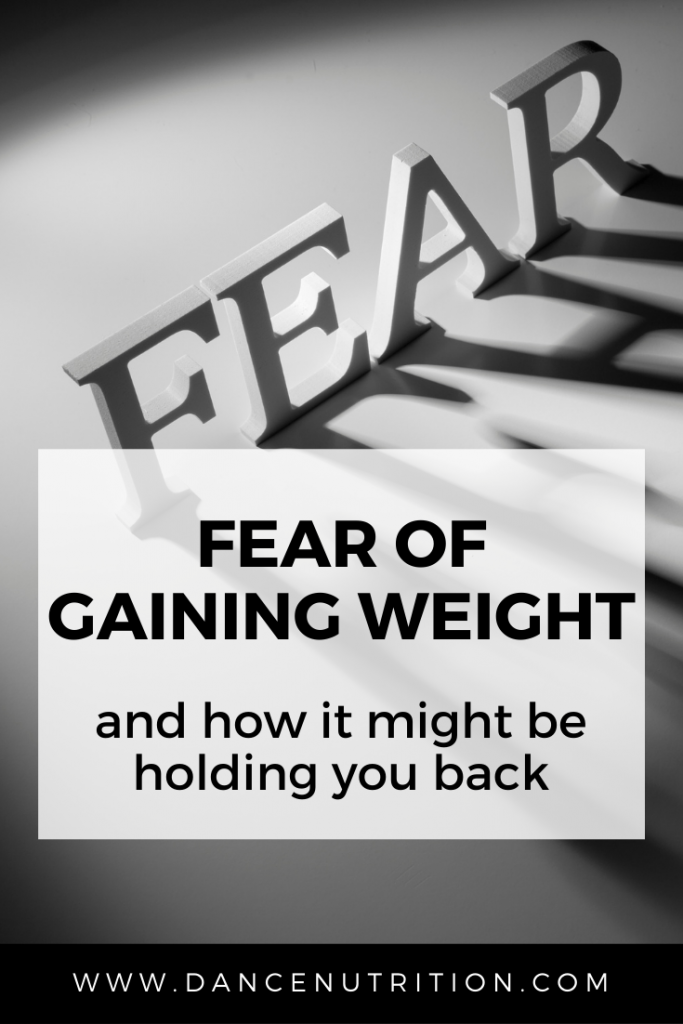In my over a decade of experience as a licensed dietitian for dancers, I’m noticing a positive shift in how dancers are, more than ever, recognizing the importance of an adequate meal plan. Most dancers are sick of that cycle: the restrictive mindset that leads them to eventually feel out of control around food.
But despite these shifts is one major obstacle that holds most dancers back from truly dismantling the dieting mentality and taking the plunge into intuitive eating: dancers fear gaining weight.
I was there once: convinced that gaining pounds on the scale would never allow me to be a professional dancer. What I didn’t realize at the time, however, was that this fear was driving me further from success both in the studio and on stage. Trying to micromanage my weight and attempting to abide by strict food rules distracted my training efforts. I was headed towards burnout and ultimately, injury.
Why are dancers scared of gaining weight?
Given the intensity of body ideals in both dance culture and the culture at large, it is completely valid to have a fear of gaining weight. This double whammy makes it nearly impossible for a dancer to NOT fear weight gain.
When it comes to weight gain, we often fear how it will impact our dancing:
- Will we look “out-of-shape?”
- Will it be difficult to partner?
- Will we fit into our costumes?
From a large-scale perspective, fears of gaining weight often stem from cultural weight stigma and social assumptions that higher weights mean we’re:
- Following unhealthy eating habits
- Less attractive/less beautiful
- Less successful
- Unworthy of the social standard
- Unhappy
During a layoff or time spent not dancing, you may gain weight. It’s also possible that you’ll lose weight and maybe even maintain your weight. If you’re coming from a place of extreme food restriction, you’ll likely experience weight gain upon healing your relationship with food. The truth is, it’s nearly impossible for anyone, even a clinician like myself, to predict how your body will respond to adequate nourishment. And in case you were wondering, an artistic director with a weight chart cannot dictate your ideal body weight. Coming to terms with these unknowns can cause many anxieties for dancers.
Your set point weight matters
Though not widely accepted by the mainstream, when compared to your day-to-day food choices, genetics play a much larger role in your body shape. Set-point weight is where your body wants to be to function optimally. Though considered a theory, the evidence around set-point weight has been around for decades. The theory involves the body’s subconscious control over weight— impacting energy intake (via appetite cues) and energy output (via desires to move or rest). Many factors impact your body’s set point, including genetics, metabolism, and even a history of dieting.
Dieting can cause your set point weight to change over time. This change is often seen as an increase in weight. When we diet, our body fights to maintain homeostasis by adapting its metabolism— ultimately, lowering it. As the body enters this state of self-imposed starvation, it attempts to conserve as much energy as possible in fear that an energy replenishment won’t happen anytime soon. This is why dancers need to stop dieting ASAP and instead, lean into resources that encourage adequate nourishment.
What’s my set point weight?
If you’re still growing (younger than 20 years) likely, you haven’t yet reached your set point weight. While there is some research showing how we can lower our set-point weight, realize this is likely not possible for dancers striving for unrealistic weight goals. If you’re confused about whether or not you’re at your set-point weight, then ask yourself: can I maintain my current weight without obsessively counting calories and limiting my food intake? Dancers can read more about defining a healthy body weight here.
Will I ever drop my fear of weight gain?
Fear of weight gain is often the most common barrier to a dancer’s ability to eat more food throughout the day. Despite the facts presented above, many dancers still feel limited in their ability to live without stringent food rules. This is because many dancers fear that a non-diet approach could say, result in a body type that is seen as “unacceptable” for a dancer. (FYI- I understand that it’s easier for me to write about this topic as a dancer and dietitian with thin privilege.)
But before you say “no way” to a non-restrictive lifestyle, I encourage you to consider this: for reasons that I explained earlier, diets don’t work for dancers. As performing athletes, dancers need mental- and physical- support to perform at their best. Obsessing about their bodies and limiting their diets will not allow for that.
To start building a supportive relationship with food, dancers must address any lurking fear of weight gain. This involves lots of unlearning— anti-fat messaging set forth by a fat-phobic culture. It also involves an active approach to anxiety management (especially over the unknown of how bodies might change) along with navigating body image distress and increasing levels of body dysmorphia (this might involve physical discomfort resulting from body changes). Before we can unravel a fear, we need to both validate its presence and identify its roots.
10+ truths about dancer weight gain
- Despite what BMI ranges suggest, a weight that is only maintained through the use of restrictive dieting is not healthy.
- Even if you don’t technically feel (or are considered to be) “underweight,” a weight that is maintained only through restrictive eating behaviors is not your ideal weight.
- It is nearly impossible to achieve your fullest dancing potential if you’re ruminating about weight and food.
- Fears of weight gain magnify unsupportive thoughts like “One “bad” meal or snack will ruin me!”
- If you gain weight, you might experience discomfort. These feelings are often temporary and can be navigated alongside the support of a licensed clinician such as a mental health therapist.
- Peers may comment on your weight, especially if weight changes happen. This can be painful— but support is helpful.
- Likely, other peers will not care whether or not your body changes… these are the relationships to focus on.
- Dance schools and companies may reprimand weight gain. These environments are not supporting you.
- It’s also possible that dance schools and companies will celebrate your body’s capabilities over weight gain— these environments are supporting you.
- Even if you gain weight, consider what else you’re gaining— relationships, experiences, opportunities.
How To Stop Fearing Weight Gain- Tips for Dancers
Step 1: Validate Your Fear
Much of this is mentioned above— recognizing the discomfort from the uncertainties of how our bodies will respond to adequate nourishment. Remember: scale weights do not account for true body composition. From strong bones to muscles, scale weights are highly inaccurate for dancers and athletes. Additionally, scale weights have zero bearings on your artistry.
Step 2: Reassess Your Values
Now that you’ve validated and identified WHY you fear gaining weight, it’s time to build new connections with your thoughts. Your brain is currently running with one thought: if I gain weight, I will be less successful because I will not have the “ballet body.” First, let’s assess what would happen if you attempted to “control” your weight (using tactics like dieting and exhaustive exercise routines):
- You’re likely to feel obsessed with numbers.
- You’ll probably start calorie-counting
- …and track your weights…obsessively.
- You’ll likely begin measuring your daily mood off that number.
These experiences can consume your mental and emotional well-being. Instead, can you envision a life free from food and body obsession? What would happen to your mental space? Would it feel freer? Might you have more energy to devote to additional hobbies or say your artistry in class? Here are some additional questions to consider (adapted from fellow anti-dietitian Christy Harrison):
- What are your greatest values in life?
- What do you lose when you’re obsessing over calories and weight?
- What do you gain from that obsession—in other words, what needs does it meet?
- How might you get those needs met in other, more positive ways?
- How do you want to spend your limited time on this planet?
Step 3: Rewire Your Thoughts
Utilizing practical affirmations is your first step to building new thoughts. My favorites are:
- My body deserves to be taken care of with nourishing meals.
- I am a good example to other dancers about how to love their bodies.
- I am learning how to love my body.
- I love delicious food and there is no shame in that.
- I want to treat my body with love and respect.
Once you’ve accumulated your favorites, it’s time to proactively set reminders. Similar to dancing, repetition is how your brain will re-learn and streamline a more helpful thought process. Forcing yourself to see these reminders (like putting them as alerts on your phone) daily is great exercise.
Step 4: Shift Your Behaviors
Now let’s translate your new thoughts into new behaviors. Shift your goals away from body weight and onto your daily fueling strategies. Practice food flexibility, honor choices when accessible, and challenge restrictive rules. Once you’ve developed a solid relationship with food, you can utilize the principles of gentle nutrition to build a nourishing menu. Here is a list of articles to start with:
- First, make sure your metabolism is functioning optimally (read more here).
- Next, differentiate between food preferences and food rules.
- Last, apply nutrition information in a non-obsessive way.
If you are scared of gaining weight, then you’re inhibiting yourself from diving into these supportive habits. I’m excited for you to begin this journey. I know how tough it is to drop a fear that our culture obsessed over. But at the end of the day, your fear is more likely to lead you to burnout, not to a successful career.




